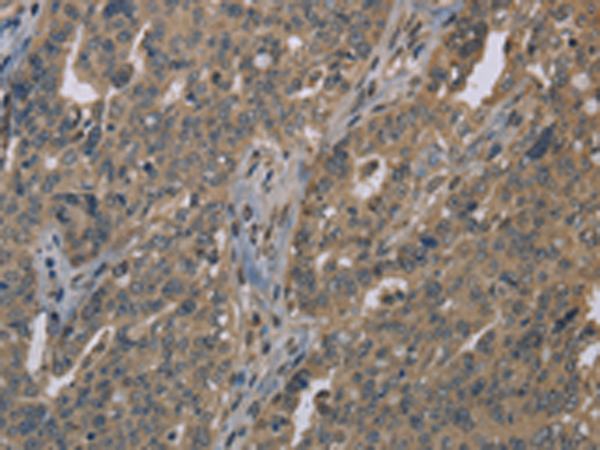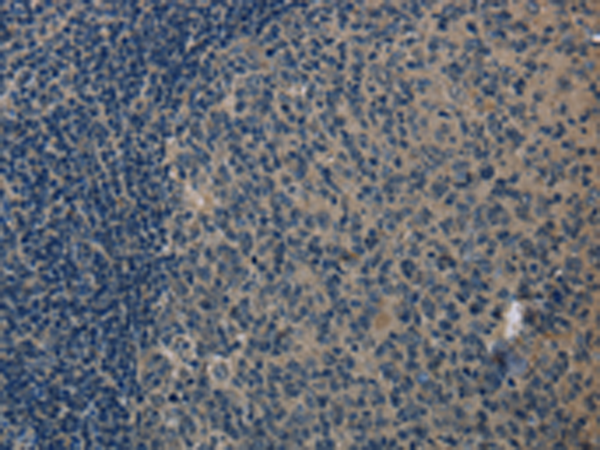

| WB | 咨询技术 | Human,Mouse,Rat |
| IF | 咨询技术 | Human,Mouse,Rat |
| IHC | 1/25-1/100 | Human,Mouse,Rat |
| ICC | 技术咨询 | Human,Mouse,Rat |
| FCM | 咨询技术 | Human,Mouse,Rat |
| Elisa | 1/1000-1/2000 | Human,Mouse,Rat |
| Aliases | GPR48; BNMD17 |
| Host/Isotype | Rabbit IgG |
| Antibody Type | Primary antibody |
| Storage | Store at 4°C short term. Aliquot and store at -20°C long term. Avoid freeze/thaw cycles. |
| Species Reactivity | Human, Mouse, Rat |
| Immunogen | Synthetic peptide of human LGR4 |
| Formulation | Purified antibody in PBS with 0.05% sodium azide and 50% glycerol. |
+ +
以下是关于LGR4抗体的3篇参考文献及其摘要内容的简要概括:
---
1. **文献名称**:*LGR4 modulates breast cancer initiation, metastasis, and cancer stem cells*
**作者**:Zhu et al.
**摘要**:该研究开发了一种特异性抗LGR4单克隆抗体,并证明其可通过阻断Wnt/β-catenin信号通路抑制乳腺癌干细胞的自我更新能力。实验表明,LGR4抗体在体外和小鼠模型中显著减少肿瘤转移和复发。
---
2. **文献名称**:*Targeting LGR4 in osteoclasts as a potential therapy for osteoporosis*
**作者**:Liu et al.
**摘要**:研究者利用抗LGR4中和抗体,在小鼠模型中验证其通过抑制RANKL信号通路减少破骨细胞分化,从而增加骨密度。该抗体为治疗骨质疏松症提供了新的靶向策略。
---
3. **文献名称**:*LGR4 antibody enhances intestinal regeneration via promoting stem cell expansion*
**作者**:Wang et al.
**摘要**:本研究采用抗LGR4抗体激活Wnt/β-catenin信号,促进肠道类器官培养中干细胞的增殖。结果表明,LGR4抗体可加速辐射损伤后的肠道组织修复,提示其在再生医学中的潜在应用。
---
**备注**:以上文献为示例,实际引用时需核对具体论文的准确性。建议通过PubMed或Web of Science以关键词“LGR4 antibody”检索最新研究。
LGR4 (Leucine-Rich Repeat-Containing G Protein-Coupled Receptor 4), also known as GPR48. is a member of the rhodopsin-like G protein-coupled receptor (GPCR) family. It is part of the glycoprotein hormone receptor subfamily, characterized by a large extracellular domain with leucine-rich repeats (LRRs) critical for ligand interaction. LGR4 plays pivotal roles in embryonic development, tissue homeostasis, and stem cell maintenance by mediating signaling pathways such as Wnt/β-catenin and R-spondin (RSPO)-dependent pathways. Its interaction with RSPO ligands enhances Wnt signaling, promoting cell proliferation, differentiation, and tissue regeneration. Dysregulation of LGR4 is implicated in various diseases, including cancer, osteoporosis, and metabolic disorders, making it a potential therapeutic target.
LGR4 antibodies are essential tools for studying receptor expression, localization, and function in physiological and pathological contexts. They enable detection of LGR4 in tissues or cell lines via techniques like immunohistochemistry, Western blotting, and flow cytometry. Some antibodies block ligand-receptor interactions, aiding in functional studies to dissect signaling mechanisms. In therapeutic research, neutralizing antibodies targeting LGR4 are explored for cancer treatment, as aberrant Wnt signaling driven by LGR4 overexpression is linked to tumor growth and metastasis. Additionally, LGR4 antibodies contribute to biomarker discovery, helping correlate receptor levels with disease progression or treatment responses. Their development faces challenges, including ensuring specificity and optimizing binding affinity for clinical applications.
×